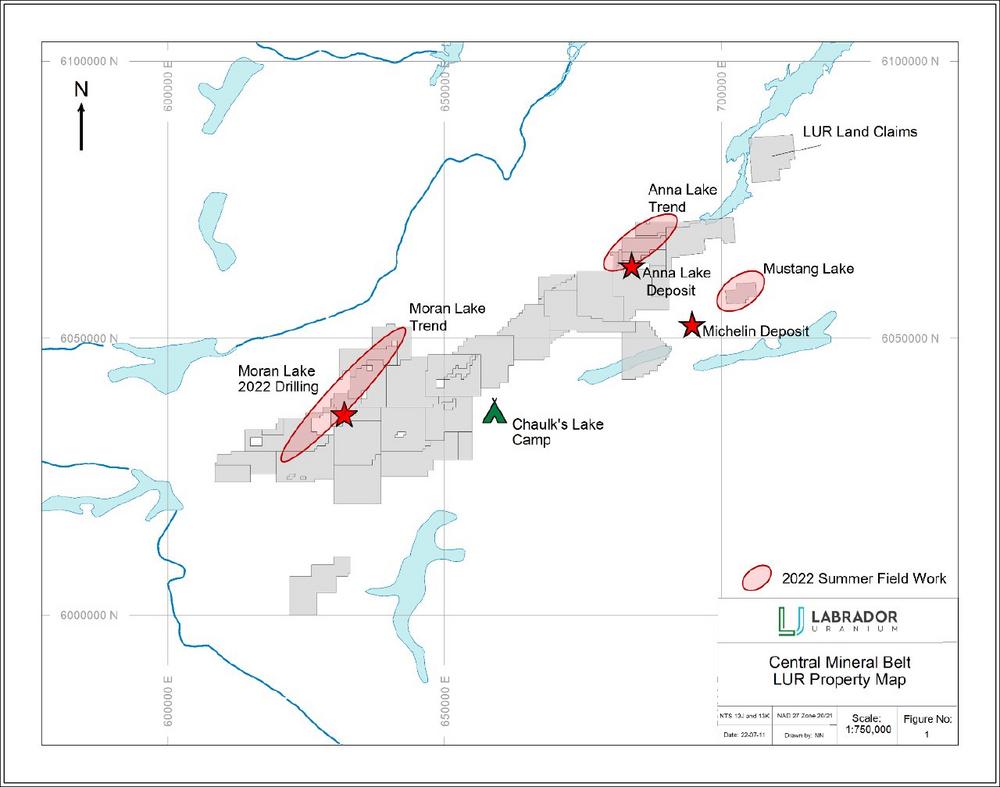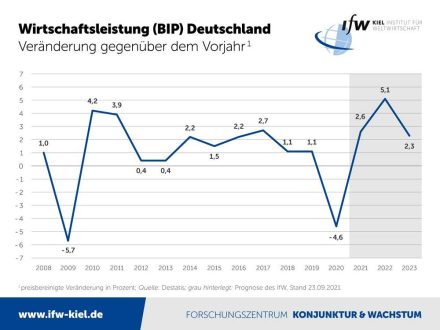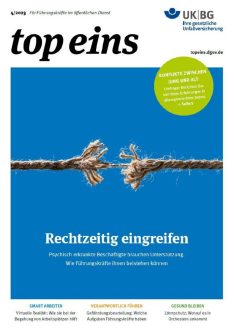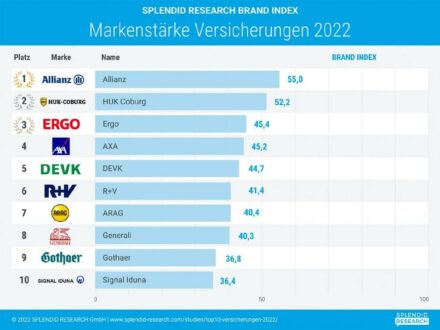
Labrador Uranium Provides Exploration and Machine Learning Update
The inaugural program includes a drill campaign and bedrock mapping program along the 20+ kilometer-long Moran Lake Trend (Figure 1). The goal of the current drilling program is two-fold: 1) to test the extent of the known historical uranium deposits/resources; and 2) to zero-in on conceptual Uranium and IOCG (Iron Oxide Copper-Gold) targets derived from LUR’s Machine Learning Program. Current exploration in the CMB also includes preparatory work for ground geophysics in the Mustang Lake prospect area, where the target is to find uranium mineralization similar to Paladin Energy’s Michelin Deposit.
Stephen Keith, CEO of LUR, commented, “Our inaugural exploration program, which began in mid-July, is progressing well. Not only are we advancing our knowledge of the Moran Lake project, but we are also starting to yield results from our initial Machine Learning Program, leading to specific drill targets. Drilling and sampling data continues to be added for mineral resource modelling, and to potentially extend the limits of known mineralization while developing possible new Uranium and IOCG targets through Machine Learning, an iterative process.”
Mr. Keith continued, “Additionally, we have started preparing to revive exploration at Mustang Lake, which we believe is located along strike from Paladin Energy’s Michelin deposit. We look forward to continuing to methodically advance our exploration efforts on our extensive land package with a modern approach to understanding 50 years of exploration data. With a strong balance sheet, we are fully funded for exploration into next year and we are excited to generate new projects within the CMB and to hopefully be in a position to delineate mineral resources in the ground. The LUR team and I would like to personally thank our shareholders for their support during these exciting times as energy supply issues become more critical.”
Drill Campaign – Moran Lake Trend
The first holes of the current drill program have intersected probable extensions of uranium-bearing structural corridors. Two zones of characteristic alteration and anomalous radioactivity ranging from 10 – 30 metres downhole (true width unknown) intersected in hole ML-200 (Figure 2), extending known mineralization downdip and possibly identifying new uranium-bearing, high angle structures. This new information will be incorporated into LUR’s geological modelling and machine learning efforts to develop new priority uranium drill targets.
The Moran Lake Trend is transected by dozens of late faults and lineaments as defined by geological mapping and geophysics (Figure 3). Each of these structures is a potential pathway for the transport of oxidized mineralizing fluids associated with inferred IOCG systems that may be present within the CMB Property.
Several 2022 drill targets are designed to test and vector towards prospective IOCG-type targets, which are characterized by iron-rich alteration and elevated copper, uranium, and vanadium values. Assay results are pending for the drill holes completed to date. The interpretations derived from the 2022 drill program will be fed into LUR’s ongoing geomechanical modelling and machine learning programs to help the Company identify possible new Uranium and IOCG targets.
The Moran C Zone is located in the western part of the CMB Property and represents LUR’s most advanced project in the CMB Property. The most prolific areas of uranium mineralization known to date occur in two zones referred to as the “Upper C Zone” and the “Lower C Zone”. Within the Upper C Zone, mineralization is hosted within brecciated, variably hematite-altered, mafic volcanics and hematitic cherts, while the Lower C Zone hosts uranium mineralization within chloritized sandstones. The most recent historical indicated mineral resource estimate of 6.92 million lbs at 0.034% U3O8 was reported by Morgan and Giroux (2008) for the Upper C Zone, with total historical inferred mineral resource for Moran Lake Upper and Lower C Zone, Trout Pond, and Armstrong at 8.17 million tonnes at 0.032% U3O8[1]. A Qualified Person (as defined in National Instrument 43-101 – Standards of Disclosure for Mineral Projects (“NI 43-101”)) has not done sufficient work to classify the historical estimate as current mineral resources and LUR is not treating these historical estimates as current mineral resources. The primary focus of the drill program has been to extend the limits of known mineralization comprising the historical resources of the Moran Lake C Zone (Figure 3).
[1] 1 Jeffrey A. Morgan, P.Geo. and Gary H. Giroux, P.Eng. completed a NI 43-101 technical report titled “Form 43-101F1 Technical Report on the Central Mineral Belt (CMB) Uranium Project, Labrador, Canada, Prepared for Crosshair Exploration & Mining Corp.” and dated July 31, 2008, with an updated mineral resource estimate for the Moran Lake C-Zone along with initial mineral resources for the Armstrong and Area 1 deposits. They modelled three packages in the Moran Lake Upper C-Zone (the Upper C Main, Upper C Mylonite, and Upper C West), Moran Lake Lower C-Zone, two packages in Armstrong (Armstrong Z1 and Armstrong Z3), and Trout Pond. These mineral resources are based on 3D block models with ordinary kriging used to interpolate grades into 10 m x 10 m x 4 m blocks. Moran Lake Upper C-Zone has an indicated mineral resource of 6.92 million t at 0.034% U3O8 and 0.077% V2O5 or 5.19 million pounds of U3O8 and 11.75 million pounds of V2O5. A cut-off grade of 0.015% U3O8 was used for all zones other than the Lower C Zone which employed a cut-off grade of 0.035%. The total inferred mineral resource reported for the Moran Lake Upper and Lower C-Zones, Trout Pond, and Armstrong was 8.17 million t at 0.032% U3O8 and 0.088% V2O5 or 5.82 million pounds of U3O8 and 15.81 million pounds of V2O5. A thorough review of all historical data performed by a Qualified Person, along with additional exploration work to confirm results, would be required to produce a current mineral resource estimate prepared in accordance with NI 43-101.
Groundwork – Moran Lake Trend
The Company is also conducting bedrock mapping and sampling along the Moran Lake Trend to zero-in on structures associated with potential IOCG systems. Previously undiscovered supergene alteration of primary copper sulfide minerals, such as azurite and malachite, have been found in hematized porphyritic volcanics. Outcrops of the same hosting quartz veining, epidote alteration and trace sulphides (Figure 4) have been identified along the Moran Lake Trend (Figure 1). Targets developed via this groundwork will then be the focus of future ground follow-up and drilling.
Line Cutting – Mustang Lake
LUR is also currently carrying out a ground line-cutting program over the Mustang Lake property (Figure 1) in the Company’s eastern CMB claims. This work is in preparation for a planned autumn UAV magnetic survey and winter ground gravity survey. The Mustang Lake property is along trend from, and to the east of, Paladin Energy’s Michelin deposit.
Technical Disclosure and Qualified Person
The scientific and technical information contained in this news release was reviewed and approved by Matthew Melnyk, M.Sc., CPG, an advisor to LUR, who is a “Qualified Person” (as defined in NI 43-101
About Labrador Uranium Inc.
Labrador Uranium is engaged in the exploration and development of uranium projects in Labrador, Canada and holds a dominant land position covering over 139,000 ha in the prolific Central Mineral Belt (CMB) in central Labrador and the Notakwanon Project in northern Labrador. Currently, the Company is advancing the district scale CMB Project which includes the Moran Lake Deposit and Mustang Lake Project. The CMB Project area surrounds several known uranium prospects, including Paladin Energy’s Michelin deposit, with substantial past exploration work completed, and numerous occurrences of uranium, copper and IOCG style mineralization.
Cautionary Statement Regarding “Forward-Looking” Information
This news release contains "forward-looking information" within the meaning of applicable Canadian securities laws. Forward-looking information includes, but is not limited to, statements with respect planned exploration activities, mineral resource estimates, exploration targets and results thereof and other activities, events or developments that are expected, anticipated or may occur in the future. Generally, but not always, forward looking information and statements can be identified by the use of words such as “plans”, “expects”, “is expected”, “budget”, “scheduled”, “estimates”, “forecasts”, “intends”, “anticipates”, or “believes” or the negative connotation thereof or variations of such words and phrases or statements that certain actions, events or results “may”, “could”, “would”, “might” or “will be taken”, “occur” or “be achieved” or the negative connotation thereof.
Forward-looking information and statements are based on our current expectations, beliefs, assumptions, estimates and forecasts about LUR’s business and the industry and markets in which it operates. Such forward information and statements are based on numerous assumptions, including among others, that general business and economic conditions will not change in a material adverse manner, that historical mineral resources estimates could be indicative of current mineral resource estimates, that financing will be available if and when needed and on reasonable terms, and that third party contractors, equipment and supplies and governmental and other approvals required to conduct the Company’s planned exploration activities will be available on reasonable terms and in a timely manner. Although the assumptions made by LUR in providing forward looking information or making forward-looking statements are considered reasonable by management at the time, there can be no assurance that such assumptions will prove to be accurate.
Forward-looking information and statements also involve known and unknown risks and uncertainties and other factors, which may cause actual results, performances and achievements of Labrador Uranium to differ materially from any projections of results, performances and achievements of Labrador Uranium expressed or implied by such forward-looking information or statements, including, among others: limited operating history, negative operating cash flow and dependence on third party financing, uncertainty of additional financing, delays or failure to obtain required permits and regulatory approvals, no known mineral resources/reserves, aboriginal title and consultation issues, reliance on key management and other personnel; potential downturns in economic conditions; availability of third party contractors; availability of equipment and supplies; failure of equipment to operate as anticipated; accidents, effects of weather and other natural phenomena and other risks associated with the mineral exploration industry; changes in laws and regulation, competition, and uninsurable risks, community relations, delays in obtaining governmental or other approvals and the risk factors with respect to Labrador Uranium set out in LUR’s listing statement dated March 2, 2022 filed with the Canadian securities regulators and available under LUR’s profile on SEDAR at www.sedar.com.
Although LUR has attempted to identify important factors that could cause actual actions, events or results to differ materially from those contained in the forward-looking information or implied by forward-looking information, there may be other factors that cause results not to be as anticipated, estimated or intended. There can be no assurance that forward-looking information and statements will prove to be accurate, as actual results and future events could differ materially from those anticipated, estimated or intended. Accordingly, readers should not place undue reliance on forward-looking statements or information. LUR undertakes no obligation to update or reissue forward-looking information as a result of new information or events except as required by applicable securities laws.
Swiss Resource Capital AG
Poststrasse 1
CH9100 Herisau
Telefon: +41 (71) 354-8501
Telefax: +41 (71) 560-4271
http://www.resource-capital.ch
CEO
Telefon: +41 (71) 3548501
E-Mail: js@resource-capital.ch
Telefon: +41 (71) 354-8501
E-Mail: mo@resource-capital.ch
![]()



